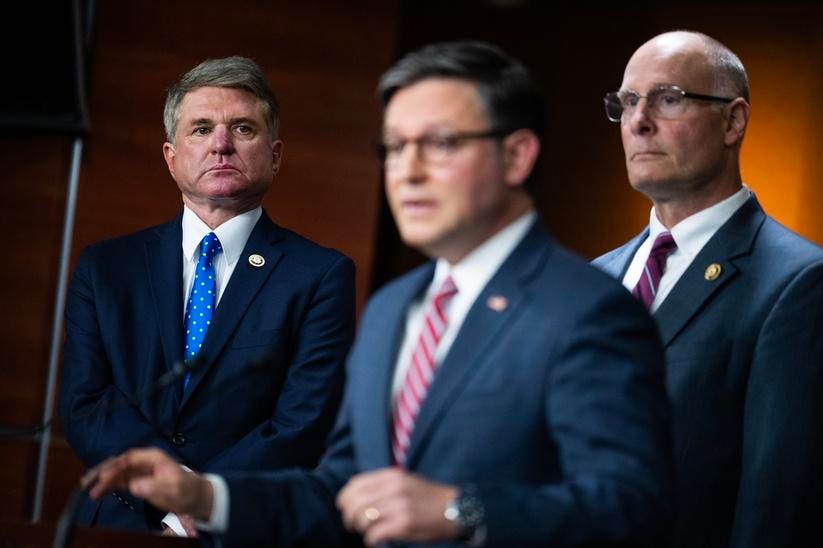UNITED STATES – SEPTEMBER 10: From left, Rep. Michael McCaul, R-Texas, Speaker of the House Mike … [+] Johnson, R-La., and Rep. John Moolenaar, R-Mich., conduct a news conference in the Capitol Visitor Center after a meeting of the House Republican Conference on Tuesday, September 10, 2024. (Tom Williams/CQ-Roll Call, Inc via Getty Images)
CQ-Roll Call, Inc via Getty Images
The House of Representatives just wrapped up a week dedicated to passing 25 China-themed bills, primarily centered on restricting Chinese companies’ presence in the U.S. market.
The purpose of “China Week,” according to John Moolenaar, Chairman of the House Select Committee on China, is for Congress to “tell Xi Jinping, this far, and no further” using “one voice.”
In practice, lawmakers did not manage to speak with such unity. Representative Raja Krishnamoorthi (D-Ill.), ranking member of the House Select Committee on Strategic Competition Between the United States and the Chinese Communist Party, told Politico he was unhappy with what was left out of the package of bills.
“Nothing to repair our industrial supply base, nothing on critical minerals and nothing to fix our legal immigration system to enhance our competitiveness,” he said, adding the bills brought to floor also lacked investments in science and innovation and efforts to upgrade the skills of the American workforce. “China week becomes a nothing-burger without those types of initiatives,” he said.
Those missing proposals would all require governance. Speaker Mike Johnson’s decision to exclude the domestic-oriented bills in favor of the targeted exclusionary ones is fueled by more than just pure hawkishness: his party has an aversion to governing. If they didn’t, they might be more likely to complement anti-China bills with ones that invest in America, which is more likely to boost the United States’ competitive advantage than restrictions alone.
But it is also more difficult. Strengthening domestic innovation takes stronger leadership than curbing access to Chinese-made batteries. The former could also necessitate government involvement in industry, which the GOP is technically allergic to, even if such involvement could help with its nefariously comprehensive goal of “beating China.”
Johnson’s choice to prioritize the bills that target China instead of—not in addition to—legislation aimed at strengthening the United States is reminiscent of Trump’s decision to sabotage the bipartisan immigration bill under consideration earlier this year. As long as the U.S. remains “behind” China in key industries, lawmakers can argue the threat persists, making bilateral rivalry an enduring campaign issue. Simultaneously, House Republicans can score short-term political points for flouting their “tough on China” chops.
Uni-pronged legislation that restricts Chinese companies without coming up with a plan to replace them also highlights the global sector Congress is targeting: green energy. The House passed bills aimed at electric vehicles and rechargeable batteries. Another bill seeks to weaken the U.S.-China Science and Technology Cooperation Agreement, which has a productive track record advancing clean energy and public health in both countries.
Whether or not voters ask those follow-up questions largely depends on the degree to which they value renewable energy, as well as something more foundational, science — and its basis, fact.
For only the second time in the magazine’s history, Scientific American endorsed a presidential candidate. In backing Vice President Kamala Harris, the editors frames the election as a choice between a future leader who values fact and one who is known for a particularly dangerous subgenre of fiction. They imagine a future President Trump who “endangers public health and safety and rejects evidence, preferring instead nonsensical conspiracy fantasies” and “fills positions in federal science and other agencies with unqualified ideologues.”
Those ideologues would have varying opinions on China. Trump has described Xi Jinping as a “very good friend” and has praised his leadership. He also launched a trade war and broke precedent by calling the president of Taiwan when he was President-elect.
TOPSHOT – US President Donald Trump (L) shakes hand with China’s President Xi Jinping at the end of … [+] a press conference at the Great Hall of the People in Beijing on November 9, 2017. – Donald Trump and Xi Jinping put their professed friendship to the test on November 9 as the least popular US president in decades and the newly empowered Chinese leader met for tough talks on trade and North Korea. (Photo by Fred DUFOUR / AFP) (Photo by FRED DUFOUR/AFP via Getty Images)
AFP via Getty Images
The leader of the GOP has inconsistent views on China, like so many other issues. The fact that lawmakers from both sides of the aisle have diagnosed some of the same conditions relating to the U.S.-China relationship does not mean they agree on how to treat them, as Democrats’ disappointment in China Week demonstrates.
But a future Harris administration should re-conceptualize the nature of the competition with China such that it does not favor perceived economic security threats over tangible transnational ones such as climate change.
Our next president by no means needs to be “very good friends” with Xi Jinping. She does, however, need to take seriously the tangible benefits firms and individuals from the world’s second largest economy offer the United States and the world. Doing so would give her enhanced bandwidth and credibility to get “tough” on China’s increasingly authoritarian leader, not its renewable energy companies.
Source link : https://www.forbes.com/sites/johannacostigan/2024/09/19/china-week-tar-chinese-firms-fails-to-boost-americas/
Author :
Publish date : 2024-09-19 04:46:00
Copyright for syndicated content belongs to the linked Source.
